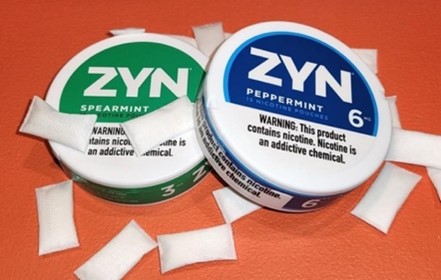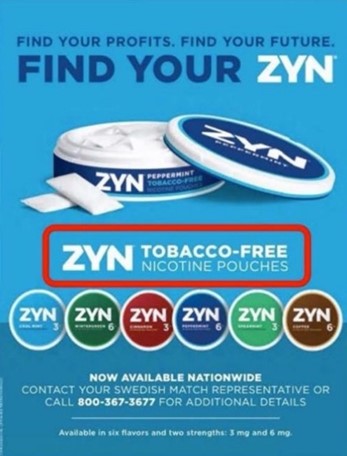Zyn Lawsuit Alleges ‘Unreasonably Dangerous’ Nicotine Pouches Are Advertised to Kids
Last Updated on July 29, 2024
A proposed class action lawsuit claims the big tobacco companies behind Zyn have purposefully marketed the oral nicotine pouches to kids while downplaying the viral products’ addiction and health risks.
Want to stay in the loop on class actions that matter to you? Sign up for ClassAction.org’s free weekly newsletter here.

The 35-page Zyn lawsuit alleges tobacco company Swedish Match North America and parent Philip Morris International (PMI) have advertised and sold the “unreasonably dangerous” products without adequate warnings about the health risks of nicotine addiction. The case also contends that the companies target underage buyers by marketing the small nicotine pouches—which “look[] like chewing gum”—on social media and selling them in a variety of “gum-like flavors,” such as wintergreen, peppermint, spearmint and cinnamon.
In addition, the suit alleges Swedish Match and PMI “purposefully target[] youth and naïve tobacco users” by advertising Zyn as “tobacco-free,” as this statement, the lawsuit relays, misleadingly implies that the nicotine delivery product is less harmful than others, or that there is a reduced risk of addiction. Although Zyn pouches technically do not contain tobacco leaves, their nicotine content is, in fact, derived from tobacco, the filing emphasizes.
Overall, the class action lawsuit argues that Zyn pouches are merely the latest tool for tobacco companies to wrangle new, younger customers.
“Zyn is just a recent iteration of the tobacco industry’s historical practice of designing a nicotine delivery device that hooks kids to nicotine while making them think it is not dangerous or harmful,” the suit alleges.
Further still, the filing shares that although Zyn is touted as a “smokeless” nicotine replacement therapy for cigarette or e-cigarette users, the U.S. Food and Drug Administration (FDA) has not authorized Swedish Match and PMI to market the pouches as a “modified risk tobacco product” or “tobacco cessation device.” At any rate, the nicotine concentration in Zyn pouches—which are available in three-, six- and eight-milligram (mg) concentrations—exceeds the levels found in other nicotine replacement therapies, the Zyn lawsuit.
A typical cigarette smoker absorbs 1mg of nicotine into the body per cigarette. Zyn’s own research shows that at its 3 mg nicotine concentration, 1.59 mg of nicotine per single pouch is absorbed into the body; at its 6 mg concentration, 3.51 mg of nicotine per pouch is absorbed; and at its 8 mg concentration, 3.79 mg of nicotine per pouch is absorbed. Zyn, therefore, delivers a potent dose of nicotine into the bloodstream.”
Notably, oral nicotine pouches such as Zyn are sold in a wider range of flavors than FDA-approved nicotine replacement gums or lozenges, the complaint shares, arguing that this is true simply because “[f]lavored nicotine exists to addict kids to it.”
Lawsuit says Zyn is dangerous, particularly for young people
The case contends that Swedish Match and PMI have failed to adequately warn consumers about the addiction and health risks associated with Zyn’s nicotine content. Per the complaint, nicotine use can increase stress levels and symptoms of depression and anxiety, and heighten a user’s risk of cardiovascular, respiratory and gastrointestinal conditions. It is also associated with suppressed immune response and reproductive problems, among other health concerns, the filing states.

Kids are especially vulnerable to nicotine addiction, as early exposure to the substance can have long-term adverse effects on brain development, the lawsuit explains.
“Nicotine use during adolescence disrupts the formation of brain circuits that control attention, learning, and susceptibility to addiction,” the suit shares. “Research has shown early age of nicotine use is correlated with daily use and lifetime nicotine dependence.”
As the Zyn lawsuit tells it, roughly 90 percent of nicotine users start by the age of 18, with more than 80 percent continuing use into adulthood.
As such, the complaint claims that Zyn’s warning label—which reads, “This product contains nicotine. Nicotine is an addictive chemical.”—is “entirely insufficient” to relay the “true extent of the dangers” posed by the product.
Zyn relies on age-old youth marketing tactics, suit claims
The lawsuit alleges that Zyn’s promotions “exploit” themes that the tobacco industry knows resonate with adolescents, relying on statements like “Freedom,” “Finding Your Curiosity,” “Never Miss a Moment” and “Find Your Zyn” to attract the youth market. The defendants also benefit from so-called “Zynfluencers”—social media influencers who promote Zyn on TikTok and other platforms, the complaint relays.
The filing asserts that no company understands youth marketing practices better than PMI, which has for years “profited by addicting kids to Marlboro cigarettes,” its most recognized and popular product, the lawsuit shares. The suit contests that Swedish Match and PMI, which employ the same “deceptive” tactics to market the nicotine pouches, have merely “replaced Marlboro with Zyn.”
“For decades, Philip Morris intentionally exploited adolescents’ vulnerability to imagery by creating advertising that utilizes themes of independence, adventurousness, sophistication, glamour, athleticism, social inclusion … and being ‘cool,’” the lawsuit says.
Who’s covered by the lawsuit?
The case looks to represent anyone who has purchased Zyn products in the United States.
I’ve bought Zyn products. How can I join the lawsuit?
Typically, there’s nothing you need to do to join, sign up for or add your name to a class action lawsuit when it’s first filed. The time to act is if there is a class action settlement, at which time the people covered by the deal—known as class members—may be notified directly by mail and/or email with a notice of their rights and instructions on the next steps to take.
Remember, it can take months or even years for a class action to be resolved.
If you’ve purchased Zyn products, or just want to keep up with class action lawsuit and settlement news, sign up for ClassAction.org’s free weekly newsletter.
Video Game Addiction Lawsuits
If your child suffers from video game addiction — including Fortnite addiction or Roblox addiction — you may be able to take legal action. Gamers 18 to 22 may also qualify.
Learn more:Video Game Addiction Lawsuit
Depo-Provera Lawsuits
Anyone who received Depo-Provera or Depo-Provera SubQ injections and has been diagnosed with meningioma, a type of brain tumor, may be able to take legal action.
Read more: Depo-Provera Lawsuit
How Do I Join a Class Action Lawsuit?
Did you know there's usually nothing you need to do to join, sign up for, or add your name to new class action lawsuits when they're initially filed?
Read more here: How Do I Join a Class Action Lawsuit?
Stay Current
Sign Up For
Our Newsletter
New cases and investigations, settlement deadlines, and news straight to your inbox.
Before commenting, please review our comment policy.